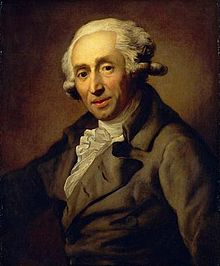Ernst Platner

Ernst Platner (born June 11, 1744 in Leipzig ; † December 27, 1818 there ) was a German physician , physiologist and (natural) philosopher . He is regarded as the "co-founder of modern anthropology as a medical-philosophical science of the whole human being".
Life
Ernst Platner studied at the St. Thomas School in Leipzig . After the death of his father Johann Zacharias Platner , Johann August Ernesti became his foster father. From 1762 to 1766 he studied medicine and philosophy at the University of Leipzig . He received his doctorate in 1767 with a work in natural philosophy on somatic memory bases as Dr. med. and in 1770 became an associate professor of medicine. In 1780 he became a full professor of physiology , 1801 extraordinary and 1811 full professor of philosophy. As a philosopher, Ernst Platner was a supporter of Gottfried Wilhelm Leibniz and an opponent of Immanuel Kant , with whom he was in close contact, as with Moses Mendelssohn . He also dealt with public health as well as psychological , aesthetic , ethical and forensic issues.
His main work Anthropology for Doctors and Weltweise influenced Johann Gottfried von Herder , Friedrich Schiller and Karl Philipp Moritz as well as Johann Karl Wezel and Jean Paul and is considered to be one of the most important anthropological works of the Late Enlightenment .
In 1781 he was in a public dispute with Johann Karl Wezel .
Platner was rector of Leipzig University in 1783 and 1789, and since 1808 a member of the Bavarian Academy of Sciences . From 1796 to 1810 he was dean of the medical faculty.
In Rome resident, Saxon d'affaires at the Holy. Chair , Ernst Zacharias Platner (1773-1855), was his son. He also worked as a painter and art historian.
Publications
- Letter from a doctor to his friend about the human body. 2 volumes, Leipzig 1770–1771.
- Anthropology for doctors and worldly. Leipzig 1772
- New anthropology for doctors and world-wise. Leipzig 1790
- About atheism. A conversation. Leipzig 1783
- Philosophical aphorisms along with some instructions on philosophical history. First part Leipzig 1776; Second part Leipzig 1782
- Quaestiones physiologicae. Leipzig 1794
- Quaestiones medicinae forensis. 43 parts, Leipzig 1797-1817.
literature
- Alexander Košenina : Ernst Platner's anthropology and philosophy. The 'philosophical doctor' and its effect on Johann Karl Wezel and Jean Paul . Königshausen & Neumann, Würzburg 1989.
- Alexander Košenina: Plat (t) ner, Ernst. In: New German Biography (NDB). Volume 20, Duncker & Humblot, Berlin 2001, ISBN 3-428-00201-6 , p. 513 f. ( Digitized version ).
- Guido Naschert, Gideon Stiening (ed.): Ernst Platner (1744-1818). Constellations of the Enlightenment between philosophy, medicine and anthropology . Meiner, Hamburg 2007 ( Enlightenment . 19).
- Alexander Košenina (ed.): Ernst Platner - The Professor . Wehrhahn, Hannover 2007, ISBN 978-3-86525-021-6 .
- Alexander Košenina (Ed.): Ernst Platner - anthropology for doctors and worldly . Reprint from 1772. Olms, Hildesheim 2000, ISBN 978-3-487-10586-4 .
- Carl von Prantl: Platner, Ernst . In: Allgemeine Deutsche Biographie (ADB). Volume 26, Duncker & Humblot, Leipzig 1888, p. 258 f.
- Ortrun Riha : Ernst Platner. In: Werner E. Gerabek , Bernhard D. Haage, Gundolf Keil , Wolfgang Wegner (eds.): Enzyklopädie Medizingeschichte . De Gruyter, Berlin 2005, ISBN 3-11-015714-4 , p. 1168.
- Thomas Sturm: Kant and the human sciences. Mentis Verlag, Paderborn, chap. 2. (On Platner's anthropology and its opponents.)
- Franco Volpi , Julian Nida-Rümelin (ed.): Lexicon of philosophical works (= Kröner's pocket edition . Volume 486). Kröner, Stuttgart 1988, ISBN 3-520-48601-6 .
Web links
- Literature by and about Ernst Platner in the catalog of the German National Library
- Overview of Ernst Platner's courses at the University of Leipzig (winter semester 1814 to summer semester 1818)
- Ernst Platner in the professorial catalog of the University of Leipzig
- http://nwschlinkert.de/2013/08/11/der-gute-geist-ernst-platners-zur-entwicklung-des-poetisch-ich-jean-pauls-essay/
Individual evidence
- ↑ His biographer Alexander Kosenina rates this as his "most significant achievement in terms of the theory of science": Article Plat (t) ner, Ernst . In: New German Biography .
- ↑ A. Košenina: Ernst Plattner anthropology and philosophy. The "philosophical doctor" and its effect on Johann Karl Wezel and Jean Paul. Wuerzburg 1989.
| personal data | |
|---|---|
| SURNAME | Platner, Ernst |
| BRIEF DESCRIPTION | German anthropologist, physician and philosopher |
| DATE OF BIRTH | June 11, 1744 |
| PLACE OF BIRTH | Leipzig |
| DATE OF DEATH | December 27, 1818 |
| Place of death | Leipzig |